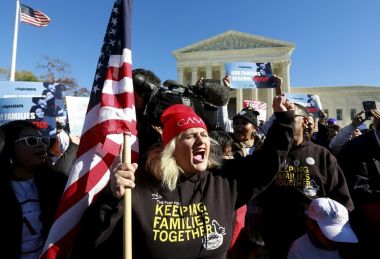Supreme Court to hear challenge to Obama immigration policies in 'landmark case on separation of powers'

The U.S. Supreme Court has agreed to review a challenge to the Obama administration's immigration executive actions that have been blocked by a Texas court, according to the American Center for Law & Justice (ACLJ) which plans to file an amicus brief with the court on behalf of members of Congress and thousands of disaffected Americans.
President Obama announced in November 2014 a policy to allow undocumented immigrants who meet criteria to stay and work in the U.S. for three years.
The policy was blocked by a Texas court whose decision was upheld by a federal appeals court.
"This is a landmark case involving the separation of powers," said Jay Sekulow, ACLJ chief counsel. "Our position from the beginning has been very clear: President Obama is not a king and impatient presidents don't get to change the law."
The White House welcomed the decision of the U.S. Supreme Court to hear the case.
"We've got a lot of confidence in the legal arguments that we'll be making before the court," Press Secretary Josh Earnest told reporters, adding that the executive actions "were clearly consistent with the precedent that was established by other Presidents, and clearly within the confines of his authority as President of the United States."
But Sekulow said the "executive overreach is both unlawful and unconstitutional."
"We will be representing members of Congress and thousands of Americans in a brief urging the Supreme Court to uphold the appeals court decision—and put a stop to the impermissible overreach that has been the hallmark of this president," he said.
During the course of the case, the ACLJ, according to Charisma News, has represented 113 Members of Congress—25 U.S. senators and 88 members of the House of Representatives.
According to the SCOTUS blog, the oral arguments are expected to happen in April and the decision is expected in late June.
The ACLJ said that in challenging the federal appeals court's decision, the Obama administration posed three questions before the Supreme Court: Whether a State that provides benefits to all aliens granted deferred action (temporary suspension of being able to be deported) has standing under Article III and a justiciable cause of action under the Administrative Procedure Act (APA) to challenge the Executive action because it will lead to more aliens having deferred action; whether the Executive action is arbitrary and capricious or otherwise violates the law; and whether the Executive action was subject to the APA's notice-and-comment procedures.











